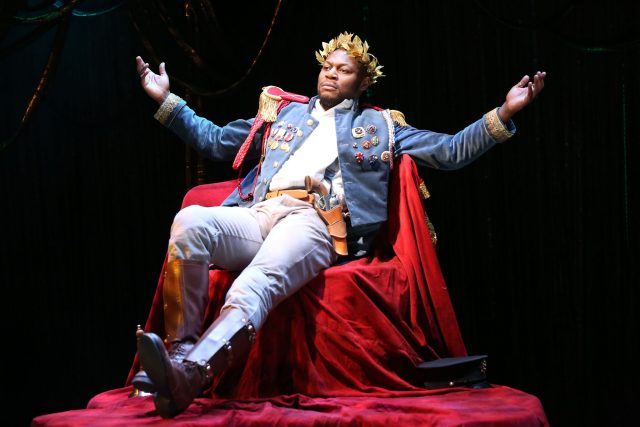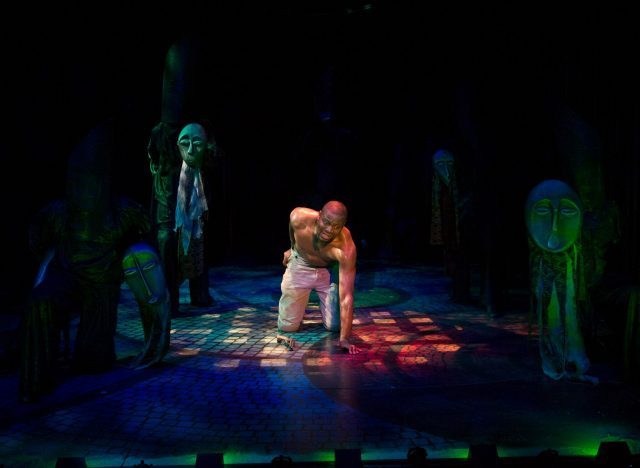
Brutus Jones (Obi Abili) suddenly finds himself in trouble as the emperor of an unnamed Caribbean nation in Eugene O’Neill revival (photo by Carol Rosegg)
Irish Repertory Theatre, Francis Greenburger Mainstage
132 West 22nd St. between Sixth & Seventh Aves.
Tuesday – Sunday through May 21, $50-$70
212-727-2737
irishrep.org
In the fall of 2009, the Irish Rep presented Eugene O’Neill’s 1920 play, The Emperor Jones, during President Barack Obama’s first year in office, a positive time of hope and change that also saw a rise in hate speech in what was most definitely not a postracial America. Irish Rep producing director Ciaran O’Reilly’s award-winning production is now back, returning on the heels of Donald Trump’s election to the White House, also a time of rising hate crimes and political correctness across a deeply divided country. Inspired by stories about Haitian president Vilbrun Guillaume Sam as well as German Expressionism and Joseph Conrad’s 1899 novella, Heart of Darkness, O’Neill sets The Emperor Jones in an unnamed Caribbean nation, where Brutus Jones (Obi Abili) has declared himself dictator after escaping from a U.S. prison. Wearing a military uniform reminiscent of Marcus Garvey’s, Jones says to brash British colonialist Henry Smithers (Andy Murray), “Talk polite, white man! Talk polite, you heah me! I’m boss heah now, is you fergettin’?” A moment later, Jones brags to Smithers, “Ain’t r de Emperor? De laws don’t go for him. You heah what I tells you, Smithers. Dere’s little stealin’ like you does, and dere’s big stealin’ like I does. For de little stealin’ dey gits you in jail soon or late. For de big stealin’ dey makes you Emperor and puts you in de Hall o’ Fame when you croaks. If dey’s one thing I learns in ten years on de Pullman ca’s listenin’ to de white quality talk, it’s dat same fact.” Smithers warns Jones that a revolt against him is under way, which the emperor first dismisses but then believes, sending him off on a hallucinatory journey through the Great Forest, where, in the spirit of Macbeth, he encounters his checkered past and faces his ultimate fate, all the while a tom-tom beating in the distance like the pumping aorta in Edgar Allan Poe’s “The Tell Tale Heart.”

Brutus Jones (Obi Abili) faces his past in Irish Rep revival directed by Ciaran O’Reilly (photo by Carol Rosegg)
The role of Jones was originated by Charles S. Gilpin at the Provincetown Playhouse and then on Broadway, but it was later made famous onstage and onscreen by Paul Robeson. Controversy has surrounded the play from the very beginning because of its use of stereotypes, speech, and rampant use of the N-word by both Jones and Smithers. However, in a 1924 article in Opportunity: A Journal of Negro Life, Robeson wrote, “And what a great part is ‘Brutus Jones.’ His is the exultant tragedy of the disintegration of a human soul. How we suffer as we see him in the depths of the forest re-living all the sins of his past — experiencing all the woes and wrongs of his people — throwing off one by one the layers of civilization until he returns to the primitive soil from which he (racially) came.” The debate over whether the work itself is racist or an exploration of racist oppression, especially now, following the recent expurgation of the N-word from a new edition of Mark Twain’s Adventures of Huckleberry Finn, continues; however, O’Neill doesn’t do himself any favors by describing one character in the script as “a heavy-set, ape-faced old savage of the extreme African type, dressed only in a loin cloth.”
Regardless of where you find yourself on the racist controversy, it’s hard to deny the sheer power of the play, which is both uncomfortable to watch and utterly captivating in this intense and intimate production. Following in the footsteps of John Douglas Thompson at the Irish Rep (in addition to such other Jones portrayers as Ossie Davis, Albie Woodington, Paterson Joseph, and Kate Valk in blackface), Abili (Six Degrees of Separation, Titus Andronicus) fully embodies the role, his fear palpable as he encounters moving trees, masked figures, and puppets acting out scenes from his past as he gets lost in the forest and starts doubting his mind. Murray (War Horse) makes Smithers a fine foil for Jones, as ready to cut him down as to cower at his feet. Everyone involved deserves kudos: The haunting set design is by Charlie Corcoran, with regional costumes by Antonia Ford-Roberts and Whitney Locher, evocative lighting by Brian Nason, eerie choreography by Barry McNabb, affecting music by Christian Frederickson, stirring sound design by Ryan Rumery and M. Florian Staab, Caribbean puppets and masks by Bob Flanagan, and cool props by Deirdre Brennan. The ensemble also includes William Bellamy, Carl Hendrick Louis, Sinclair Mitchell, Angel Moore, and Reggie Talley. It might have been written nearly a century ago, but The Emperor Jones can still shock, providing no easy outs, particularly in this poignant version that bookends the Obama years.